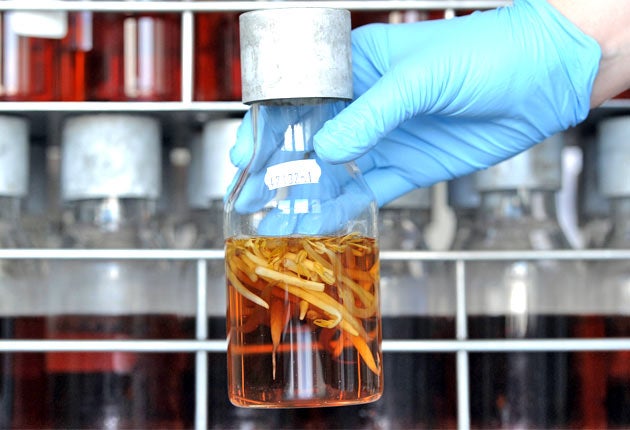EU sandwiched between Spain and Germany in cucumber wars
Aid worth £134m promised to farmers left impoverished by E.coli outbreak

The European Union responded to mounting fury over its handling of the devastating E.coli outbreak yesterday by proposing €150m (£134m) in aid for thousands of farmers forced to destroy their crops in a forlorn attempt to curb the epidemic.
Click HERE to view graphic (223k jpg)
The offer came during an emergency meeting of EU agriculture ministers in Luxembourg which descended into unexpected farce as the Spanish delegate took to brandishing a cucumber on the floor to underline the dire plight of his country's vegetable farmers.
Spain, outside Germany the country hardest hit economically by the crisis, is estimated to have been losing about €225m a week in lost vegetable exports since Berlin mistakenly claimed last month to have found the pathogen causing the E.coli outbreak in imported Spanish cucumbers.
The warnings brought exports of most Spanish vegetables to a standstill, caused the EU to issue its own warning and prompted Russia to ban the import of all EU vegetables. In Germany, where the government has kept its warning in place since the start of the crisis, farmers say their output has been decimated.
Waving a cucumber aloft, Francisco Sosa-Wagner, a Spanish MEP, lambasted Germany for "rushing in without due caution" to sully the reputation of his country's produce. He blamed the European Commission for providing "no co-ordination and no leadership" over the crisis and demanded a revision of the European food safety alert system.
"We have to restore the honour of the cucumber," Mr Sosa-Wagner said. "We have told Germany that it must reimburse us for the loss. If it covers 100 per cent, which is what we are demanding, the affair will be closed. Otherwise we reserve the right to take legal action," he insisted. France also demanded "100 per cent compensation" for its farmers.
Germany was also targeted by John Dalli, the EU Health Commissioner, who accused Angela Merkel's government and the health authorities of overreacting. "It's crucial that national authorities don't rush to give information on the source of the infection when it's not justified by science," he said.
His criticisms were echoed by Dacian Ciolos, the EU's Agriculture Commissioner, who urged Germany's health authorities to find the source of the E.coli epidemic as quickly as possible. "Without this answer, it will be difficult to regain the trust of consumers, which is essential for the market to regain its strength," he said.
In Germany, however, there was no sign that health investigators had come any closer to identifying the source of the aggressive mutant strain of the E.coli bacteria that has so far killed 22 people and infected more than 2,400 others. Responding to criticism that the country's federal system was too complicated to effectively deal with such an epidemic, Ilse Aigner, the Agriculture Minister, insisted: "Our crisis management system is working. The authorities are concentrating all their resources on battling the epidemic."
Health authorities in the northern state of Lower Saxony claimed on Sunday to have found a "very likely" source of the epidemic at a vegetable farm near Uelzen, south of Hamburg, which specialises in growing bean sprouts.
However, investigators announced on Monday that a first batch of 17 tests carried out on some of the farm's seeds, tables in a packing area, and its ventilation system had all proven negative. Officials have insisted that the first results are not conclusive and that a further 23 tests have still to be conducted at the farm.
The investigators have also drawn a blank on tests carried out on a package of bean sprouts from the farm which a Hamburg resident had left in his fridge since late April. Health officials had hoped that, because of its old sell-by date, they would find traces of the killer E.coli strain in the package. Yesterday they had to admit they found nothing.
Clinics and hospitals in and around Hamburg, which are bearing the brunt of the epidemic, have issued public appeals for more blood donors. Many are filled to capacity and have been obliged to farm patients out to other hospitals in the region.
Yesterday officials said the 17 hospitals treating E.coli patients in the region had additional costs of more than €100,000 each and faced the prospect of bankruptcy if the epidemic continued for much longer.
However, health officials in the port city were able to offer some reassurance yesterday and said the number of cases of infection appeared to be declining and that many of those in hospital were now recovering.
"There is a ray of hope on the horizon," one Hamburg city government minister said.
Join our commenting forum
Join thought-provoking conversations, follow other Independent readers and see their replies
Comments